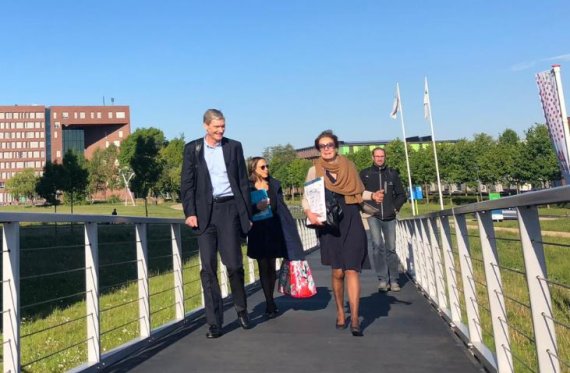‘We want to be challenged. Louise Fresco is an independent thinker and an expert on food who will definitely hold up a mirror to us.’
Resource spoke to Fyrwald on 15 May on the sidelines of the F&A Next event in Wageningen.
It was DSM boss Feike Sijbesma, a common acquaintance, who suggested Fresco to the CEO. He visited Fresco on Wageningen campus a year ago for an initial chat. She wanted time to think about it and asked for more information, but decided to accept the offer at the start of this year. Fresco already briefly explained her Syngenta appointment in a press release and in Resource.
Syngenta is in transition, says Fyrwald. Up to a few years ago, the company’s focus in the sale of seed and crop protection agents was on higher yields for farmers, but its mission has now become much broader. These days, Syngenta also needs to play a role in combating further deforestation and climate change, reducing the use of water in agriculture, improving soil fertility and curbing the use of pesticides.
That means Syngenta plans to sell lower volumes of crop protection agents that are more effective and therefore add ‘more value for our growers’. The company also wants to sell more organic crop protection products and provide more services, for example in the form of precision agriculture with targeted, precise spraying. ‘The volume of crop protection products will continue to decline,’ predicts Fyrwald. ‘We need a lot of research so that we can make better, safer products.’
Fyrwald is looking for new partners to make the food sector more sustainable. For example, he wants to collaborate with supermarkets to agree on the criteria they set for sustainable food. He sees organic farming as a big marketing success but believes a more sustainable form of agriculture is possible that has lower greenhouse gas emissions and uses less water than organic agriculture.
Syngenta wants to be part of such a food label through its seeds, organic crop protection products, services and data communication. Fyrwald: ‘A key goal is to increase production and reduce the emission of greenhouse gases on every farm.’
A key goal is to increase production and reduce emissions
Critics say companies such as Syngenta share responsibility for the environmental harm caused by mainstream agriculture and have not as yet developed any varieties that spare the environment. Do they have a point? Fyrwald points to a new drought-resistant maize variety developed by Syngenta. ‘We now know maize DNA and we know which genes are responsible for drought tolerance, for example. We have a lot more knowledge than 20 years ago, which means we can develop plants that are more sustainable or resistant to disease.’

 Erik Fyrwald and Louise Fresco, Photo: Resource
Erik Fyrwald and Louise Fresco, Photo: Resource